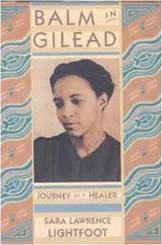Shari Thurer, ScD, is a BPSI Psychotherapist Member. Her below remarks originally appeared in the Winter 2021 issue of the library newsletter, which can be read here.

Reading Balm in Gilead during the pandemic was literary comfort food. The book is fundamentally the story of a Black family, who, by dint of hard work and middle-class values, did well, and more importantly, “did good” as healers and academics. In it, Sara Lawrence-Lightfoot, a Harvard sociologist, describes the journey of her mother, Margaret Morgan Lawrence, one of the first Black psychoanalysts. It is no rags- to-riches story, nor a melodramatic account of racism overcome, but a polite description of a mother’s challenging history by a loving daughter.
Margaret Morgan, born in 1914, in Vicksburg, Mississippi, was the brown-skinned daughter of a dark-skinned minister and a light-skinned, depressive mother. She recalls life in Vicksburg as privileged for she was well-placed in the city’s Black community and had no contact with the racist white city. Morgan moved on to graduate from Cornell (where she was the only Black undergraduate), and then earned a master’s in public health and a medical degree from Columbia, and certificates from the New York Psychiatric Institute and the Columbia Psychoanalytic Clinic. She married light-skinned Charles Lawrence in 1938. It was a long and happy marriage, producing the author, Sara Lawrence-Lightfoot. Along the way, she encountered obstacles including financial difficulties, sexism, racism and colorism, even within the Black community.
I repeatedly mention skin color as that is what stands out to this white reviewer, since much of the Morgan/Lawrence biography is organized around this theme. Lightfoot honestly reveals the racial dynamics within Black culture, wherein lighter skin is prized. Perhaps Lawrence’s psychoanalytic training facilitated her openness about the meaning of color, which she conveyed to her daughter. Obviously, Lawrence was a “good enough” mother, instilling in Lightfoot enough self-esteem to write truthfully about a sticky subject to a multiracial audience. Lawrence died in 2019 at age 105. Lightfoot was the recipient of a MacArthur Prize Award, which she used to write this book.
Shari Thurer, ScD, is a BPSI Psychotherapist and Library Committee Member, a former Adjunct Associate Professor at Boston University, a psychologist in Boston, and the author of many noted publications, including Myths of Motherhood: How Culture Reinvents the Good Mother (Houghton Mifflin Harcourt, 1994) and The End of Gender: A Psychological Autopsy (Routledge, 2005).
Shari Thurer can be contacted by email here.
* * *
The opinions or views expressed on the Boston Psychoanalytic Society & Institute (“BPSI”) social media platforms, including, but not limited to, blogs, Facebook posts and Twitter posts, represent the thoughts of individual contributors and are not necessarily those of the Boston Psychoanalytic Society & Institute or any of its directors, officers, employees, staff, board of directors, or members. All posts on BPSI social media platforms are for informational purposes only and should not be regarded as professional advice.
BPSI does not control or guarantee the accuracy, relevance, timeliness or completeness of information contained in its contributors’ posts and/or blog entries, or found by following any linked websites. BPSI will not be liable for any damages from the display or use of information posted on its website or social media platforms. BPSI cannot and does not authorize the use of copyrighted materials contained in linked websites.

